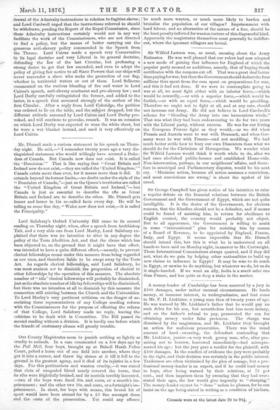Lord Salisbury's Oxford University Bill came to its second -reading
on Thursday night, when, after a speech from Archbishop Tait, and a very able one from Lord Morley, Lord Salisbury ex- plained that there was no intention to alter in any degree the policy of the Tests Abolition Act, and that the clause which has been objected to, on the ground that it 'might have that effect, was intended to have a quite different effect,—namely, to prevent clerical fellowships recast under this measure from being regarded as new ones, and therefore liable to be swept away by the Tests Act. As regards clerical fellowships, said Lord Salisbury, he was most anxious not to diminish the proportion of clerical to other fellowships by the operation of this measure. The absolute number of " idle"clerical fellowships will probably be diminished, just as the absolute number of idle lay fellowships will be diminished, but there was no intention at all to diminish by this measure the connection still existing between the Church and the Universities. To Lord Morley's very pertinent criticism on the danger of as- sociating three representatives of any College needing reform with the Commissioners for the purpose of effecting the reform of that College, Lord Salisbury made no reply, leaving the criticism to be dealt with in Committee. The Bill passed its second reading without a division. It is hardly one before which the friends of customary abuses will greatly tremble.


































 Previous page
Previous page